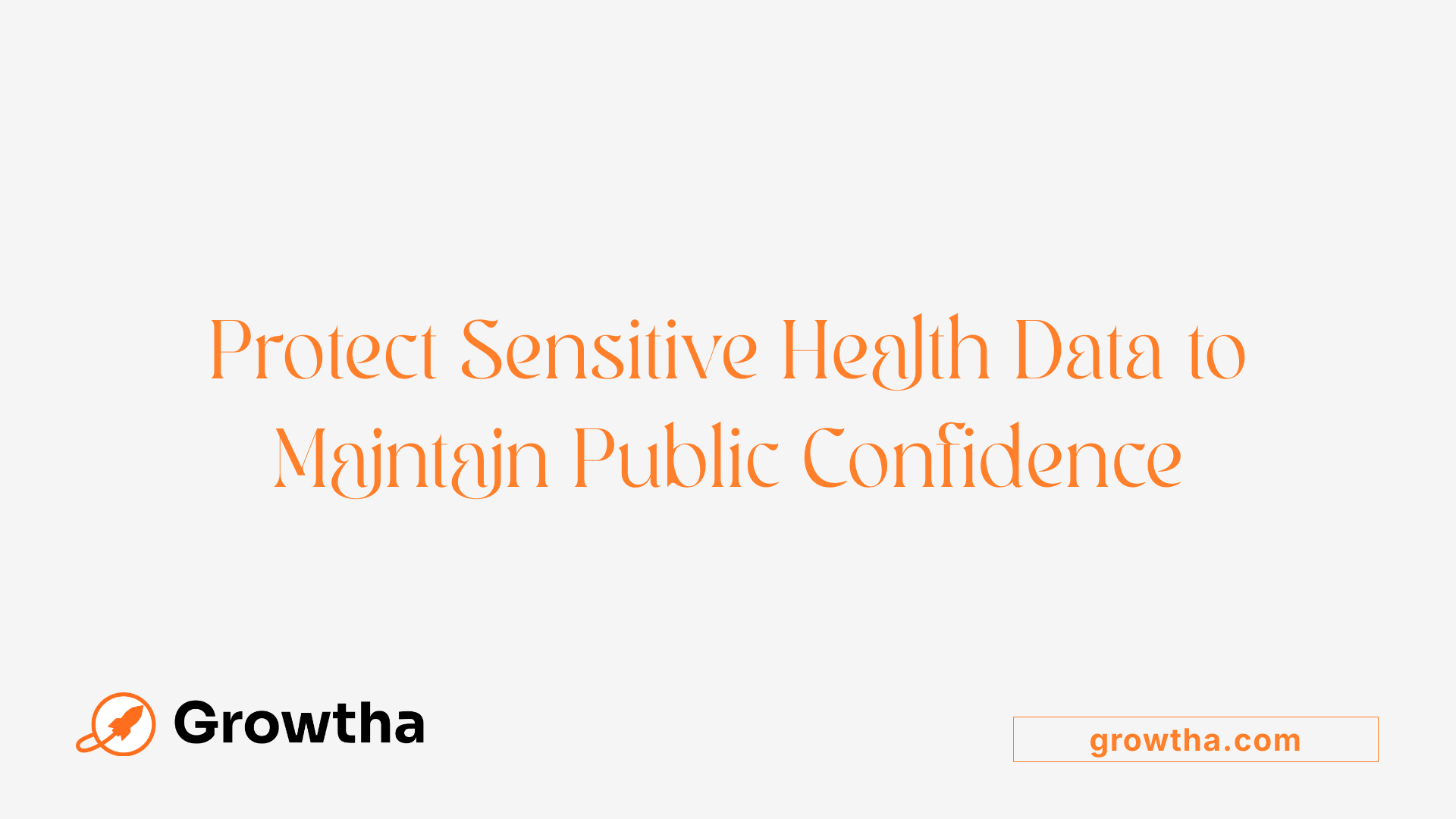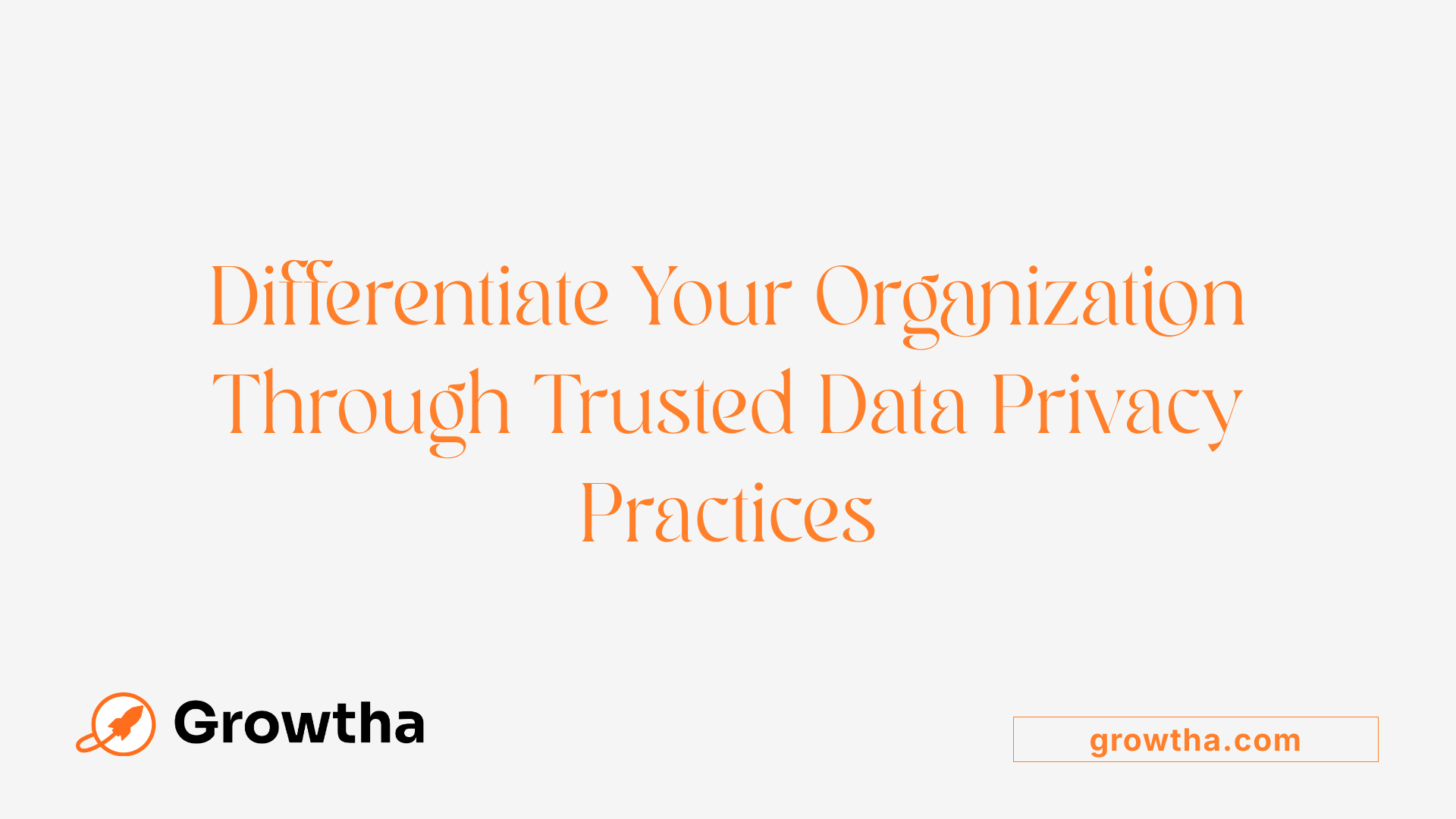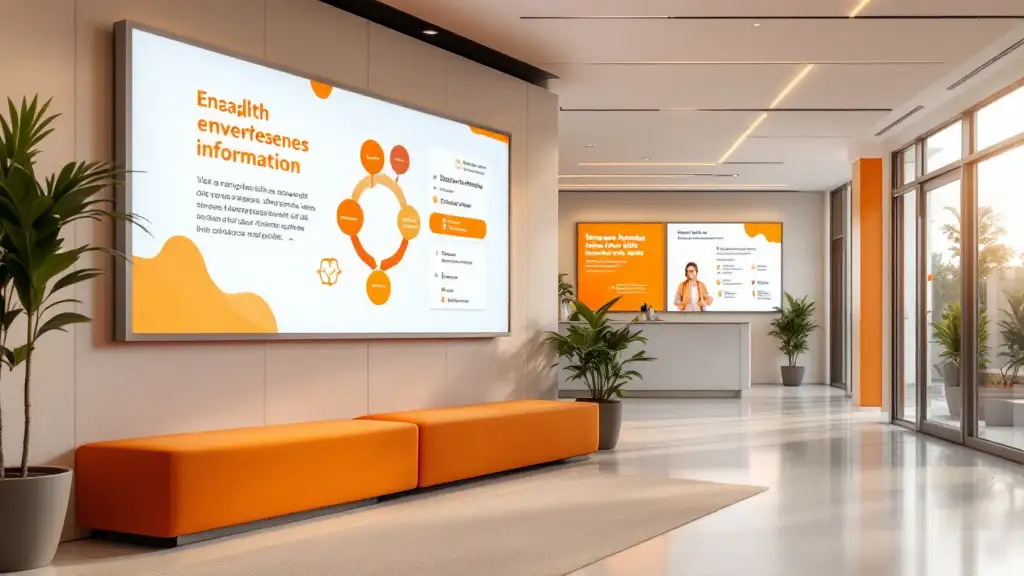The Role of Data Privacy in Healthcare Marketing Compliance
Safeguarding Patient Trust in the Digital Age


The Role of Data Privacy in Healthcare Marketing Compliance
Understanding the Cornerstone of Healthcare: Data Privacy
In the rapidly evolving digital landscape of healthcare, protecting patient data has become a fundamental component of compliance, ethical practice, and trust-building. This article explores the critical role of data privacy in healthcare marketing, examining regulatory frameworks, best practices, emerging trends, and strategic considerations for healthcare organizations committed to safeguarding sensitive information.
The Significance of Data Privacy in Healthcare

Why is healthcare data privacy important?
Healthcare data privacy is crucial for safeguarding patients' confidential information and maintaining their dignity and trust. Patients entrust healthcare providers with sensitive data such as medical histories, treatment plans, and personal identifiers. When this information is mishandled or disclosed without proper authorization, it can lead to serious consequences, including stigma, discrimination, or embarrassment.
Legal standards like the Health Insurance Portability and Accountability Act (HIPAA) in the U.S. set clear guidelines for the secure handling, storage, and sharing of protected health information (PHI). These regulations require healthcare organizations to implement strict security measures and obtain explicit patient consent for uses beyond treatment and billing.
Protecting healthcare data also ensures the integrity of the doctor-patient relationship. Patients are more likely to seek care and share honest information when they trust their data will remain private. On an ethical level, safeguarding sensitive health data upholds the fundamental principles of confidentiality and respect for patient autonomy.
In the digital marketing landscape, data privacy measures prevent unauthorized access and misuse of health information, thereby avoiding legal penalties and reputational damage. Overall, maintaining rigorous data privacy practices is essential to foster public confidence, support ethical standards, and ensure compliance with international and national regulations.
Legal Frameworks Governing Healthcare Data Privacy

What is the role of data privacy in healthcare marketing compliance?
Data privacy is fundamental to healthcare marketing, ensuring that patients’ sensitive health information remains confidential and protected from unauthorized access or disclosure. Compliance with privacy laws helps healthcare organizations build trust with patients, showing they respect and safeguard personal data.
Legal regulations such as GDPR, HIPAA, CCPA, and state laws enforce strict standards for how health data should be handled. These laws specify that data must be collected only for legitimate purposes, stored securely, and shared only with proper consent.
Implementing privacy-by-design principles is crucial. This means integrating privacy measures into every stage of data collection, processing, and marketing activities. Healthcare providers must ensure that staff are trained on data protection practices and that security measures like encryption and access controls are in place.
Timely breach reporting, transparent privacy policies, and giving patients rights to access, amend, or delete their data are also central to compliance. This not only helps avoid hefty fines—for example, HIPAA violations can lead to fines up to $68,928 per incident—but also enhances organizational reputation.
Using advanced cybersecurity strategies reduces risks of cyberattacks such as hacking, ransomware, or data leaks. This proactive approach ensures continuous safeguarding of electronic protected health information (ePHI).
Ultimately, prioritizing data privacy in healthcare marketing sustains legal compliance, fosters patient confidence, and improves overall care quality, making it a vital component of modern healthcare practices.
Impact of Data Breaches and Cybersecurity Challenges

High-profile breaches (e.g., Anthem, NHS ransomware)
Major healthcare data breaches have exposed systemic vulnerabilities, leading to significant consequences for organizations involved. Notable incidents, such as the 2015 Anthem Inc. breach, compromised millions of patient records, highlighting the risks of inadequate security measures. Similarly, the WannaCry ransomware attack on the UK’s NHS in 2017 severely disrupted healthcare services and exposed critical weaknesses in cybersecurity defenses.
Systemic vulnerabilities and industry challenges
Despite strict regulations like HIPAA, healthcare organizations face persistent challenges. Outdated IT infrastructure, limited resources, and inconsistent enforcement create openings for cybercriminals. These vulnerabilities can lead to unauthorized access, data theft, and disruption of essential services. The sensitive nature of health data makes breaches especially damaging, compromising patient privacy and eroding trust.
Emerging technologies improving security
To combat these threats, emerging technologies are enhancing healthcare cybersecurity. AI and machine learning assist in early breach detection and adaptive defense strategies. Blockchain offers secure, tamper-proof data management, and advanced encryption techniques protect data at rest and in transit. While these innovations are promising, ongoing vigilance and investment in cybersecurity infrastructure remain crucial for safeguarding healthcare data.
Innovations and Technologies Supporting Data Privacy

How HIPAA-compliant tracking solutions like Freshpaint enhance privacy
Healthcare organizations are increasingly adopting specialized tools like Freshpaint, which offers HIPAA-compliant customer data platforms. Instead of using risky third-party tracking code, these platforms utilize a single, privacy-first tracking pixel. This approach secures the collection and transfer of patient data, helping organizations comply with strict privacy regulations while measuring marketing campaign performance.
Role of server-side tracking and signal gateways
Advanced tracking technologies such as server-side tracking and signal gateways, like Stape.io’s Signals Gateway, enable privacy-safe data collection. These solutions bypass browser restrictions, focus on first-party data, and do not rely on intrusive third-party cookies. This method supports consent-based, privacy-compliant measurement and analytics.
Encryption, de-identification, blockchain, AI, and ML in healthcare privacy
Data encryption, both at rest and in transit, remains a cornerstone of protecting sensitive health information. De-identification techniques remove personal identifiers from datasets, reducing privacy risks.
Emerging technologies such as blockchain offer secure, tamper-proof ways to manage health data sharing and access. Meanwhile, artificial intelligence (AI) and machine learning (ML) are being utilized to detect breaches more quickly and monitor data security vulnerabilities.
How innovative tools help in breach detection and ensuring compliance
Tools leveraging AI and ML improve early detection of suspicious activities, enabling proactive responses to potential breaches. These technologies also facilitate continuous compliance monitoring, automating risk assessments, and maintaining audit trails. By integrating such solutions, healthcare organizations can strengthen their security posture, safeguard patient trust, and uphold legal requirements.
Best Practices in Healthcare Marketing for Data Privacy

How does data privacy relate to marketing ethics and compliance?
Data privacy is central to maintaining ethical standards and legal compliance in healthcare marketing. It involves safeguarding sensitive patient information, respecting their rights, and ensuring confidentiality. Ethical marketers are transparent about data collection methods, clearly inform patients about how their data will be used, and obtain explicit consent before any data sharing.
Compliance with laws like GDPR, HIPAA, and CCPA helps organizations avoid penalties and legal actions. Implementing secure systems, such as encrypted websites and privacy policies, shows a commitment to data protection, building trust with patients.
In the healthcare sector, respecting privacy isn’t just legal; it’s a fundamental moral principle. This approach fosters a trustworthy relationship, encouraging patients to share information openly, which ultimately enhances the quality of care and the effectiveness of marketing efforts.
Cross-departmental compliance collaboration
Ensuring data privacy in healthcare marketing requires cooperation across departments. Marketing, legal, IT, and compliance teams should regularly communicate to align their strategies.
Regular meetings and shared documentation help identify potential risks and develop uniform policies for handling patient data. This collaboration ensures that marketing campaigns are compliant from conception to execution.
Moreover, establishing clear guidelines on data handling, consent management, and incident response prepares the organization for audits and regulatory reviews.
Vendor vetting and technology integration
Choosing the right technology partners is vital. Healthcare organizations should vet vendors thoroughly for HIPAA and GDPR compliance, security features, and data privacy practices.
Platforms like Freshpaint offer HIPAA-compliant tracking solutions, transforming digital data collection into a privacy-first process.
Integrating these systems seamlessly across marketing, CRM, and analytics ensures consistent data policies and minimizes vulnerabilities.
Vendors should provide comprehensive BAAs and demonstrate their compliance through certifications and regular audits.
Staff training and education
Employees handling patient data must understand privacy laws and organization policies. Regular training sessions on HIPAA, GDPR, and internal procedures are necessary.
Training covers topics like safe data sharing, recognizing phishing attempts, and proper response to data breaches.
Well-informed staff reduces accidental violations and promotes a culture of privacy.
Transparent privacy policies and patient rights
Clear, accessible privacy policies communicate how patient data is collected, used, stored, and protected.
Patients should easily find information on their rights, including data access, correction, deletion, and opting out.
Organizations must honor these rights through straightforward processes, such as easy online forms or dedicated help desks.
Putting transparency at the heart of marketing builds trust and demonstrates a commitment to respecting patient privacy.
| Practice Area | Implementation Examples | Benefits |
|---|---|---|
| Cross-departmental collaboration | Regular meetings, shared dashboards | Ensures compliance, reduces risks |
| Vendor vetting | Certification checks, BAAs | Protects data, aligns with regulations |
| Staff training | Workshops, e-learning modules | Less violations, informed employees |
| Privacy transparency | Clear policies, patient portals | Builds trust, empowers patients |
Following these practices, healthcare marketing can be both effective and respectful of patient privacy, ensuring a sustainable and trustworthy environment.
Navigating the Evolving Legal Landscape in Healthcare Data Privacy

What is the role of data privacy in healthcare marketing compliance?
In healthcare marketing, protecting patient data is paramount to complying with legal and ethical standards. Data privacy ensures that sensitive information—such as medical histories, treatment details, and personal identifiers—is safeguarded from unauthorized access, sharing, or breaches. This protection fosters trust between healthcare providers and patients, which is vital for effective marketing efforts.
Regulatory frameworks like GDPR in Europe, HIPAA in the US, and various state laws impose strict requirements on how healthcare organizations collect, store, and manage data. These regulations emphasize transparency, requiring organizations to inform patients about data use, obtain explicit consent, and allow patients to access or delete their information. Additionally, organizations must implement technical safeguards such as encryption, secure authentication, and access controls.
By prioritizing data privacy, healthcare entities can avoid costly penalties for non-compliance, such as fines, lawsuits, or reputational damage. Employing privacy-by-design principles, staff training, and cybersecurity measures reduces risks of cyber threats like hacking or ransomware attacks. In essence, robust data privacy practices not only meet legal obligations but also improve provider reputation, patient confidence, and healthcare quality, making them essential components of compliant healthcare marketing.
Positioning as a Leader through Privacy and Compliance
 Building trust with patients and consumers is fundamental for healthcare organizations, especially in the digital age where data privacy concerns are mounting. Transparency about privacy practices, through clear communication and obtaining relevant certifications, reinforces a commitment to safeguarding sensitive health information. Demonstrating compliance with recognized standards like HIPAA not only aligns with legal requirements but also resonates with patients who value their privacy.
Building trust with patients and consumers is fundamental for healthcare organizations, especially in the digital age where data privacy concerns are mounting. Transparency about privacy practices, through clear communication and obtaining relevant certifications, reinforces a commitment to safeguarding sensitive health information. Demonstrating compliance with recognized standards like HIPAA not only aligns with legal requirements but also resonates with patients who value their privacy.
Healthcare providers can leverage privacy standards as a strategic advantage by showcasing their adherence to rigorous data protection protocols. This approach can differentiate them in a competitive market, encouraging patient engagement and loyalty. Educational initiatives, such as targeted campaigns, webinars, and clear privacy notices, help inform patients about their data rights and the measures taken to protect their information.
Case studies illustrate how some organizations have successfully built trust by prioritizing compliance. For example, hospitals that train staff on privacy regulations and openly communicate their data protection efforts have seen increased patient confidence and positive reputation impacts. Overall, a proactive privacy strategy fosters transparency, legal compliance, and enhances the organization’s reputation as a trustworthy, patient-centric provider.
Future Directions in Healthcare Data Privacy and Marketing
As healthcare organizations navigate an increasingly complex legal landscape, the importance of robust data privacy practices cannot be overstated. Future trends suggest a move toward greater transparency, enhanced technological safeguards, and uniform standards that support both compliance and patient trust. Emphasizing privacy-by-design, continuous staff training, and strategic use of innovative security tools will be essential. Ultimately, safeguarding patient data not only fulfills legal mandates but also adds to the strategic positioning of healthcare providers as trustworthy, consumer-centric entities in an era of heightened privacy consciousness.
References
- The Importance of Data Privacy in Healthcare Digital Marketing
- Privacy-Powered Marketing: How Healthcare Marketers Are Winning ...
- Compliance and Privacy Considerations in Healthcare Marketing ...
- Data privacy in healthcare: Global challenges and solutions - PMC
- Beyond HIPAA: How state laws are reshaping health data compliance
- Leveraging Data Privacy in Healthcare Marketing - Bluetext
- Healthcare Data Compliance: Security, Privacy & Compliance
- Summary of the HIPAA Privacy Rule - HHS.gov
- A Guide to Data Privacy in Healthcare: Compliance and Best Practices
- Healthcare-level privacy is the new marketing standard | Envisionit







